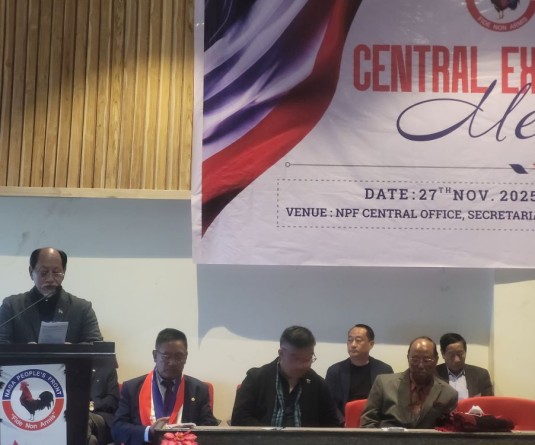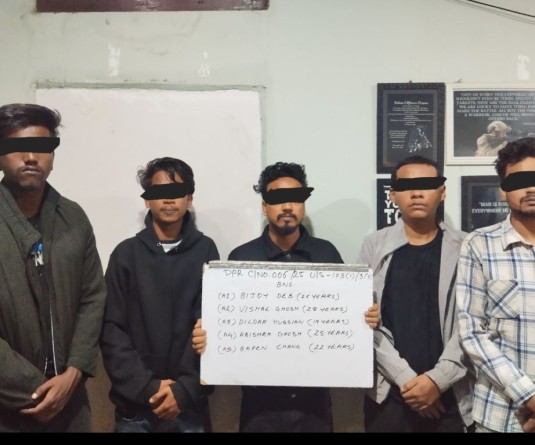
Colloquium on Oral and Literary Traditions of Nagaland
Kohima, March 28 (MExN): As part of the 40th Foundation Day of the Indira Gandhi Rastriya Manav Sangrahalaya (IGRMS), Bhopal, a colloquium on Oral and Literary Traditions of Nagaland at the Rock Art Centre, IGRMS Bhopal on March 23.
In his introduction, Prof. Sarit Kumar Chaudhuri, Director, IGRMS, who chaired the Colloquium, said that it is not only the celebration of the 40th Foundation of IGRMS, but celebration of India’s North East, specifically focused on Nagaland. Having spent almost 25 years as an anthropologist in North East, he always felt that, if you look at the larger discourse, linking India’s North East, has, many times remained an elusive domain to people in the mainland India. He stated that Nagaland, from his perspective is a state of possibilities- the possibilities which he said, were reflected in the several programmes in the 3-day celebration of the Cultural Festival of Nagaland. He spoke about the Colloquium as involving creative persons from Nagaland including writers, poets, and journalists from different generations.
Delivering the keynote address, Prof. Temsula Ao noted that the cultures of the North East are already facing tremendous challenges from education and modernization. She said that the evolution of such cultures and identities that they embody, the loss of distinct identity markers does not bode well for the trends of the region. She felt that “if the trend is allowed to continue in an indiscriminate and mindless manner, globalization will create a market in which Naga, Khasi, or Mizo communities will become mere brand names, commonly cumulative markers stripped off all human significance and which will definitely mutate the ethnic and symbolic identity of a proud people”, and added that globalization in this sense will eventually reduce identity to anonymity.
Further dwelling on language, which she described as the one essence of our humanity which governs every aspect of our being, she said that, “we exist within the ambit of our languages which defines the significance of being what we are.” She held that in our world today, writing has become primary and the orality of language discarded as a relic of the past. Pointing out that literature of our people encompasses everything about them- language, history, customs, beliefs, stories, legends, myths, their lores of migration and settlement, arts, crafts, and every small detail of their everyday lives, she stated that this is the literature of the Nagas, and that, it resides in their traditions which constitutes our primary literature.
After the turbulent years of conflict and bloodshed, she observed that a new generation of talented young Nagas, are emerging, excelling in their chosen field, in art and culture too. “We see young emerging stars, enthralling audiences with their talents both at home and abroad”, she said while adding that the youngsters deserve the best opportunities because they are the inheritors of our people who had such music and melody in their souls, who created the most amazing artifacts and textiles with their bare hands. “This new avatar of youngsters is not a one to one transference of their past into present mode. In their own way, they too are creating a new literature of reality, fusing their modernity with new insights from their past”, she underlined.
In the meantime, she said that it is heartening to see that a host of young Nagas have taken to writing poetry and fiction in English, in which they explore the contents of their present circumstances of disillusioned youth. Though they write about the present mostly, she said, “glimpses of the past are incorporated in subtle ways to create a different kind of fusion and in that sense, we can say that what distinguishes the new literature is that the oral tradition provides the writers with a copulated calculated framework wherein they are able to explore the relevance of the past value on the complexity of their social positioning and contemporary context.” Converting this orality in this sense transforms the oral tradition to recollection, inclusion, inversion, and reinterpretation into a written text, she said, and added that, “this dynamics of transference also becomes part of this emerging new literature of Nagaland.”
The Colloquium on “Oral and Literary Traditions of Nagaland” was also marked by paper presentations by Monalisa Changkija, Dr. Anungla Aier, Agnes Krocha Tepa, Vishü Rita Krocha, Phejin Konyak and Peter Bos.






